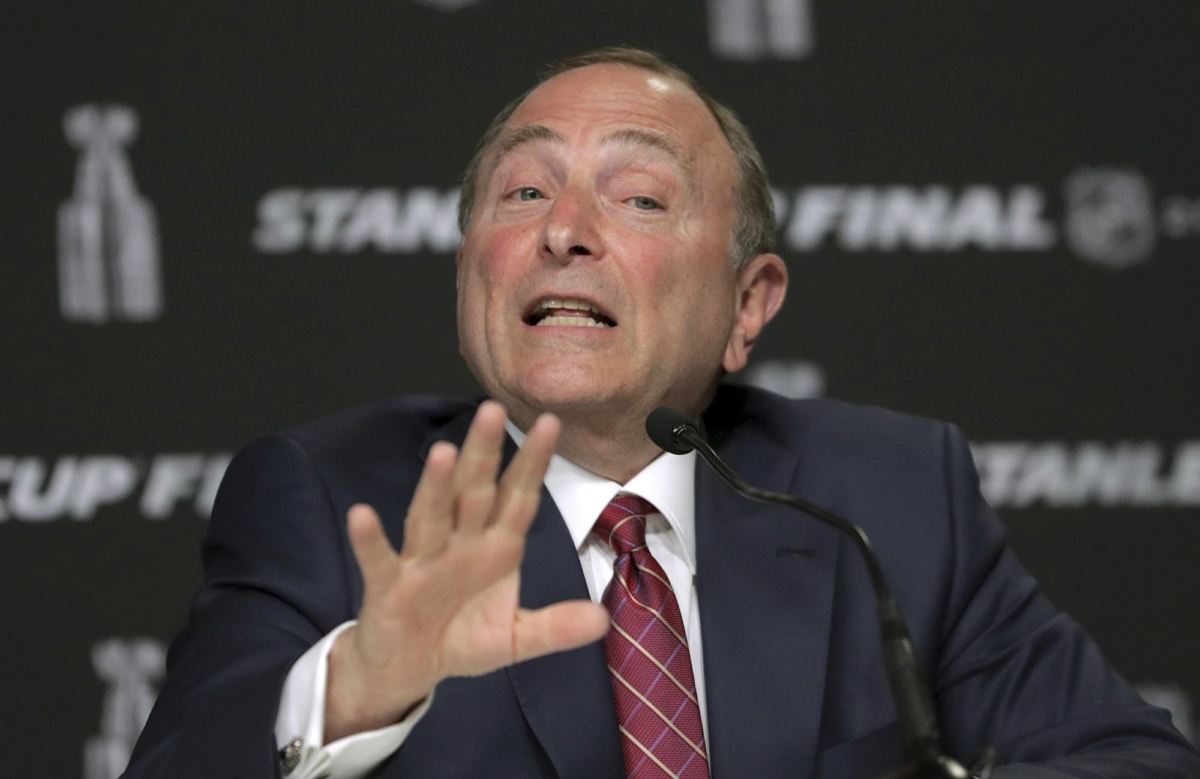National Hockey League (NHL) teams will not wear specialty jerseys for pregame warmups during themed nights next season because it has become a “distraction” this past season, a top league official confirmed on Thursday.
During an interview with Sportsnet after concluding a meeting with the league’s board of governors in New York, NHL commissioner Gary Bettman said players will no longer wear special warmup jerseys—such as rainbow jerseys on “pride nights.”
The development comes after the NHL recently dealt with controversies from players sitting out the pride-themed event over religious beliefs and personal security.
“I’ve suggested that it would be appropriate for clubs not to change their jerseys in warmups because it’s become a distraction, and taking away from the fact that all of our clubs in some form or another host nights in honor of various groups or causes. And we rather them continue to get the appropriate attention that they deserve and not be a distraction,” Bettman said.

Teams can continue to celebrate pride and all other theme nights, such as “Hockey Fights Cancer” and “Military Appreciation.” The NHL is also expected to still design and produce the jerseys to be autographed and sold to raise money. Players who choose to model the jerseys can continue to do so.
The only change will be that players will no longer skate around wearing them during warmups, said Bettman. “It’s really just the question of what’s on the ice,” he added.
“In the final analysis, all of the efforts and emphasis on the importance of these various causes have been undermined by the distraction in terms of which teams, which players,” Bettman said. “This way, we’re keeping the focus on the game, and on these specialty nights, we’re going to be focused on the cause.”
Players Sit Out ‘Pride’
Last season, there was plenty of controversy around the NHL’s “pride nights,” and it became a hot-button issue after multiple players refused to don warmup pride jerseys for personal reasons.
Nearly a dozen teams that have hosted pride nights did not have their players wear pride warmup jerseys. It all began in January, when then-Philadelphia Flyers defender Ivan Provorov, citing his Russian Orthodox faith, opted not to display pride colors in warmups ahead of a victory against the Anaheim Ducks.
“I respect everybody’s choices,” Provorov said after the game. “My choice is to stay true to myself and my religion. That’s all I’m going to say.”

The most recent instance of a player sitting out pride night was the Buffalo Sabres’s announcement on March 27 that defenseman Ilya Lyubushkin wouldn’t wear a pride jersey or participate in the team’s pride night warmup in the Sabres’ game against Montreal due to fear of retribution.
In December, Russian President Vladimir Putin signed new legislation that expanded the country’s ban on “LGBT propaganda.” Promotion of homosexuality and nontraditional sexual relations in public forums, online, and in books, films, TV, and advertising is prohibited, and violations can lead to heavy fines.
Lyubushkin is from Moscow, and his family still lives there. The Sabres’ statement didn’t name Lyubushkin, but team captain Kyle Okposo confirmed to The Associated Press that Lyubushkin would be sitting out the warmup. Lyubushkin is the only Russian player on the team.
Other players who’ve opted not to wear pride colors in warmups, citing religious beliefs, include San Jose goaltender James Reimer and brothers Eric and Marc Staal of the Florida Panthers, who are Canadian.
About a dozen teams that have already hosted pride nights did not have their players wear pride warmup jerseys. Those are the Boston Bruins, the Chicago Blackhawks, the Colorado Avalanche, the Columbus Blue Jackets, the Detroit Red Wings, the Edmonton Oilers, the Minnesota Wild, the New York Islanders, the New York Rangers, the Ottawa Senators, the Tampa Bay Lightning, and the Washington Capitals.
Bettman defended the league and teams’ handling of the situations at NHL All-Star Weekend in February, saying tolerance of varying viewpoints was part of being “open, welcoming and inclusive.”
“You know what our goals, our values and our intentions are across the league, whether it’s at the league level or at the club level,” he said at the time. “But we also have to respect some individual choices, and some people are more comfortable embracing themselves in causes than others. And part of being diverse and welcoming is understanding those differences.”
You Can Play—an organization describing itself as a group with the goal of ensuring LGBTQ athletes’ inclusion in sports—said in a statement on Twitter that it was “concerned and disappointed” by Thursday’s decision.
“Today’s decision means that the over 95% of players who chose to wear a Pride jersey to support the community will now not get an opportunity to do so,” the organization said.
“The work to make locker rooms, board rooms, and arenas safer, more diverse, and more inclusive needs to be ongoing and purposeful, and we will continue to work with our partners at the NHL, including individual teams, players, agents, and the NHLPA to ensure this critical work continues,” it continued.
The Associated Press and Jackson Richman contributed to this report.
